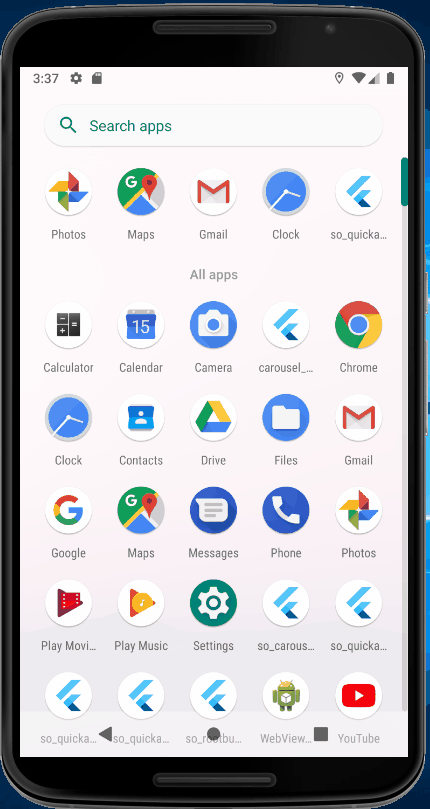Flutter Quick Actions更改所选的底部导航栏项目
我正在尝试在Flutter应用中实施主屏幕快速操作/应用快捷方式。我要实现的目标是,当用户通过快速操作启动我的应用程序时,该应用程序会更改底部导航栏中的选定标签。任何帮助表示赞赏。
main.dart:
runApp(
MaterialApp(
theme: Themes.appLightTheme,
darkTheme: Themes.appDarkTheme,
home: QuickActionsController(
child: HomeFrame(currentIndex: 0),
),
我的QuickActionsController类:
import 'package:binfinder/screens/HomeFrame.dart';
import 'package:flutter/material.dart';
import 'package:quick_actions/quick_actions.dart';
class QuickActionsController extends StatefulWidget {
final HomeFrame child;
QuickActionsController({Key key, this.child}) : super(key: key);
@override
_QuickActionsControllerState createState() => _QuickActionsControllerState();
}
class _QuickActionsControllerState extends State<QuickActionsController> {
final QuickActions quickActions = QuickActions();
int _currentIndex = 0;
@override
void initState() {
super.initState();
_handleQuickActions();
_setupQuickActions();
}
void _setupQuickActions() {
quickActions.setShortcutItems(<ShortcutItem>[
ShortcutItem(
type: 'action_map',
localizedTitle: 'Map',
),
]);
}
void _handleQuickActions() {
quickActions.initialize((shortcutType) {
if (shortcutType == 'action_map') {
setState(() {
_currentIndex = 1;
});
} else {
setState(() {
_currentIndex = 0;
});
}
});
}
@override
Widget build(BuildContext context) {
widget.child.currentIndex = _currentIndex;
return widget.child;
}
}
1 个答案:
答案 0 :(得分:1)
在下面的演示中,直接点击的应用将进入首页,在快速操作中,选择主视图将进入第二页
_handleQuickActions需要使用
Navigator.pushReplacement(
context,
MaterialPageRoute(
builder: (context) => BottomNavigationBarController(
initialIndex: 1,
)));
并使用初始索引来控制页面索引
class BottomNavigationBarController extends StatefulWidget {
final int initialIndex;
BottomNavigationBarController({
this.initialIndex,
Key key,
}) : super(key: key);
@override
_BottomNavigationBarControllerState createState() =>
_BottomNavigationBarControllerState();
}
完整代码
import 'package:flutter/material.dart';
import 'package:quick_actions/quick_actions.dart';
import 'dart:io';
class QuickActionsManager extends StatefulWidget {
final Widget child;
QuickActionsManager({Key key, this.child}) : super(key: key);
_QuickActionsManagerState createState() => _QuickActionsManagerState();
}
class _QuickActionsManagerState extends State<QuickActionsManager> {
final QuickActions quickActions = QuickActions();
@override
void initState() {
super.initState();
_setupQuickActions();
_handleQuickActions();
}
@override
Widget build(BuildContext context) {
return widget.child;
}
void _setupQuickActions() {
quickActions.setShortcutItems(<ShortcutItem>[
ShortcutItem(
type: 'action_main',
localizedTitle: 'Main view',
icon: Platform.isAndroid ? 'quick_box' : 'QuickBox'),
ShortcutItem(
type: 'action_help',
localizedTitle: 'Help',
icon: Platform.isAndroid ? 'quick_heart' : 'QuickHeart')
]);
}
void _handleQuickActions() {
quickActions.initialize((shortcutType) {
if (shortcutType == 'action_main') {
Navigator.pushReplacement(
context,
MaterialPageRoute(
builder: (context) => BottomNavigationBarController(
initialIndex: 1,
)));
} else if (shortcutType == 'action_help') {
print('Show the help dialog!');
}
});
}
}
void main() => runApp(MyApp());
class MyApp extends StatelessWidget {
// This widget is the root of your application.
@override
Widget build(BuildContext context) {
return MaterialApp(
title: 'QuickActions Demo',
home: QuickActionsManager(child: BottomNavigationBarController(initialIndex: 0,)));
}
}
class Home extends StatelessWidget {
const Home({Key key}) : super(key: key);
@override
Widget build(BuildContext context) {
return Scaffold(body: Center(child: Text('Home')));
}
}
class Login extends StatelessWidget {
const Login({Key key}) : super(key: key);
@override
Widget build(BuildContext context) {
return Scaffold(body: Center(child: Text('Login')));
}
}
class BottomNavigationBarController extends StatefulWidget {
final int initialIndex;
BottomNavigationBarController({
this.initialIndex,
Key key,
}) : super(key: key);
@override
_BottomNavigationBarControllerState createState() =>
_BottomNavigationBarControllerState();
}
class _BottomNavigationBarControllerState
extends State<BottomNavigationBarController> {
final List<Widget> pages = [
FirstPage(
key: PageStorageKey('Page1'),
),
SecondPage(
key: PageStorageKey('Page2'),
),
];
final PageStorageBucket bucket = PageStorageBucket();
int _selectedIndex = 0;
Widget _bottomNavigationBar(int selectedIndex) => BottomNavigationBar(
onTap: (int index) => setState(() => _selectedIndex = index),
currentIndex: selectedIndex,
items: const <BottomNavigationBarItem>[
BottomNavigationBarItem(
icon: Icon(Icons.add), title: Text('First Page')),
BottomNavigationBarItem(
icon: Icon(Icons.list), title: Text('Second Page')),
],
);
@override
void initState() {
_selectedIndex = widget.initialIndex;
super.initState();
}
@override
Widget build(BuildContext context) {
return Scaffold(
bottomNavigationBar: _bottomNavigationBar(_selectedIndex),
body: PageStorage(
child: pages[_selectedIndex],
bucket: bucket,
),
);
}
}
class FirstPage extends StatelessWidget {
const FirstPage({Key key}) : super(key: key);
@override
Widget build(BuildContext context) {
return Scaffold(
appBar: AppBar(
title: Text("First Screen"),
),
body: ListView.builder(itemBuilder: (context, index) {
return ListTile(
title: Text('Lorem Ipsum'),
subtitle: Text('$index'),
);
}),
);
}
}
class SecondPage extends StatelessWidget {
const SecondPage({Key key}) : super(key: key);
@override
Widget build(BuildContext context) {
return Scaffold(
appBar: AppBar(
title: Text("Second Screen"),
),
body: ListView.builder(itemBuilder: (context, index) {
return ListTile(
title: Text('Lorem Ipsum'),
subtitle: Text('$index'),
);
}),
);
}
}
演示,进入“第二页”时模拟器有点慢
相关问题
最新问题
- 我写了这段代码,但我无法理解我的错误
- 我无法从一个代码实例的列表中删除 None 值,但我可以在另一个实例中。为什么它适用于一个细分市场而不适用于另一个细分市场?
- 是否有可能使 loadstring 不可能等于打印?卢阿
- java中的random.expovariate()
- Appscript 通过会议在 Google 日历中发送电子邮件和创建活动
- 为什么我的 Onclick 箭头功能在 React 中不起作用?
- 在此代码中是否有使用“this”的替代方法?
- 在 SQL Server 和 PostgreSQL 上查询,我如何从第一个表获得第二个表的可视化
- 每千个数字得到
- 更新了城市边界 KML 文件的来源?
